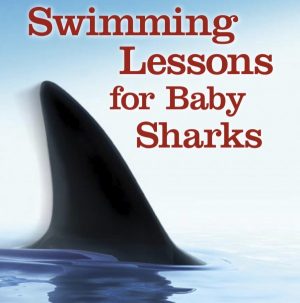Swimming Lessons For Baby Sharks: Practical Advice For New Lawyers
I hear the advice all the time that associates should not make the same mistake twice. But no one makes mistakes on purpose.

To start this column, help me help you: Send me the tips you use to make sure you track all of your time. Just send an e-mail here, tweet to @babysharklaw, or post a comment here. Easy! I will compile a roundup for a future column. I thank you, and your fellow lawyers thank you!
Q: I hear the advice all the time that associates should not make the same mistake twice. But no one makes mistakes on purpose. Do you have any suggestions to make sure mistakes don’t happen again?

Legal AI: 3 Steps Law Firms Should Take Now
A: I do. But remember that mistakes don’t just happen. Somebody does something to cause them. That means you can take steps to prevent mistakes. Here are some tips for making sure that you follow Esther Dyson’s advice and “always make new mistakes.”
First, let’s define our terms. This column is not about proposing an ingenious legal solution that a senior lawyer decides not to recommend to a client – for business reasons, or whatever. And it’s not about proposing a creative interpretation that may not persuade a senior lawyer. That is not a mistake; it’s called “practicing law.”
Generally, this column covers things that an assigning lawyer did not like about your work that will annoy the lawyer if you do it again. Some mistakes are obvious and universally scorned. Misspelling a client’s name falls into this category. With other issues, there may not be unanimity, but there is often a consensus. For example, most lawyers will consider it a mistake if you burn through hours of time before checking in about pursuing an arcane approach.
Some “mistakes” are only problems for certain lawyers. This is where things can get tricky. A lawyer may tell you to avoid specific words or phrases in your assignments. Other lawyers may not have any problem with those very same words.
Sponsored

Early Adopters Of Legal AI Gaining Competitive Edge In Marketplace

Navigating Financial Success by Avoiding Common Pitfalls and Maximizing Firm Performance

Is The Future Of Law Distributed? Lessons From The Tech Adoption Curve

Navigating Financial Success by Avoiding Common Pitfalls and Maximizing Firm Performance
Developing a system to track mistakes can save you.
- Understand the error. First make sure you understand the problem from the assigning lawyer’s perspective. If you failed to find a key case, your error may be clear cut. Obvious errors are the easiest to prevent – and will cause the most grief if they recur. But if you spent “too much” time on a project before checking in, you need to understand how the assigning lawyer defines “too much.” Clarifying other mistakes may take even more probing.
- Diagnose the problem. Once you are crystal clear about what went wrong, you need to retrace your steps and diagnose the problem. What made you (wrongly) conclude that a particular rule applied to your case? If you received the identical assignment next week, how would you change your approach? And if you are not certain about how you made (or contributed to) the mistake happen, it’s fine to ask for suggestions about doing things a different way.
- Keep track. Keep a list of the steps you will take to prevent future mistakes on similar projects. Most lawyers will not want you to put references into any document that suggests the client has done something “illegal.” If that is an issue, put it on the list. At first, your list may seem absurdly long. Over time, tasks will become second nature. Then you may be able to pare back your list.
You may also want to track mistakes that you “almost” make. For example, if you find that typos creep in when you edit your work, you may need to remember to proofread carefully, track your changes while you edit, or take some other preventive measure. If you work on many different kinds of projects, you may need several lists.
- Remind yourself. Set up a reminder to scan your list before completing an assignment. Also remember to double check numbers and names and anything else that has a clear right or wrong answer.
- Slow down. Mistakes often happen in the face of a crushing deadline. If you can approach your work methodically – and build in time to review and perfect your work – everyone’s life will be easier.
Good luck!
Sponsored

The Business Case For AI At Your Law Firm


Legal AI: 3 Steps Law Firms Should Take Now
Join the conversation by submitting questions on Twitter @Babysharklaw or here. Get the new Second Edition of Swimming Lessons for Baby Sharks here.
Grover E. Cleveland is a Seattle lawyer, speaker and author of Swimming Lessons for Baby Sharks: The Essential Guide to Thriving as a New Lawyer (West 2d. 2016). Grover specializes in programs to help new lawyers successfully transition from law school to practice, helping them provide more value and avoid common mistakes. He is a former partner at Foster Pepper PLLC, one of the Northwest’s larger firms. His clients included the Seattle Seahawks and other entities owned by Microsoft co-founder, Paul Allen. Grover is a frequent presenter on lawyer career success and generational issues at leading law firms and schools nationwide. Many questions in this column come from those programs. Readers may submit questions here or follow him on Twitter @Babysharklaw. He is not related to the 22nd and 24th President of the United States.







